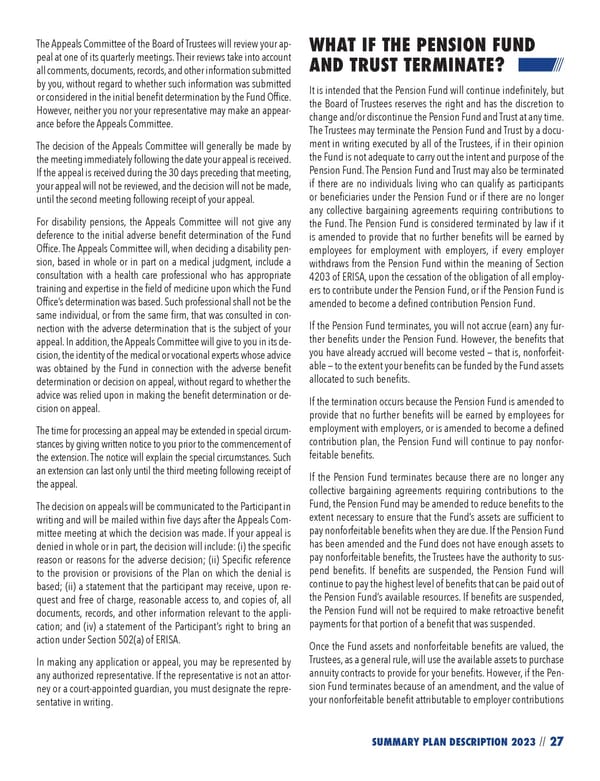27 SUMMARY PLAN DESCRIPTION 2023 // The Appeals Committee of the Board of Trustees will review your ap- peal at one of its quarterly meetings. Their reviews take into account all comments, documents, records, and other information submitted by you, without regard to whether such information was submitted or considered in the initial benefit determination by the Fund Office. However, neither you nor your representative may make an appear- ance before the Appeals Committee. The decision of the Appeals Committee will generally be made by the meeting immediately following the date your appeal is received. If the appeal is received during the 30 days preceding that meeting, your appeal will not be reviewed, and the decision will not be made, until the second meeting following receipt of your appeal. For disability pensions, the Appeals Committee will not give any deference to the initial adverse benefit determination of the Fund Office. The Appeals Committee will, when deciding a disability pen- sion, based in whole or in part on a medical judgment, include a consultation with a health care professional who has appropriate training and expertise in the field of medicine upon which the Fund Office’s determination was based. Such professional shall not be the same individual, or from the same firm, that was consulted in con- nection with the adverse determination that is the subject of your appeal. In addition, the Appeals Committee will give to you in its de- cision, the identity of the medical or vocational experts whose advice was obtained by the Fund in connection with the adverse benefit determination or decision on appeal, without regard to whether the advice was relied upon in making the benefit determination or de- cision on appeal. The time for processing an appeal may be extended in special circum- stances by giving written notice to you prior to the commencement of the extension. The notice will explain the special circumstances. Such an extension can last only until the third meeting following receipt of the appeal. The decision on appeals will be communicated to the Participant in writing and will be mailed within five days after the Appeals Com- mittee meeting at which the decision was made. If your appeal is denied in whole or in part, the decision will include: (i) the specific reason or reasons for the adverse decision; (ii) Specific reference to the provision or provisions of the Plan on which the denial is based; (ii) a statement that the participant may receive, upon re- quest and free of charge, reasonable access to, and copies of, all documents, records, and other information relevant to the appli- cation; and (iv) a statement of the Participant’s right to bring an action under Section 502(a) of ERISA. In making any application or appeal, you may be represented by any authorized representative. If the representative is not an attor- ney or a court-appointed guardian, you must designate the repre- sentative in writing. WHAT IF THE PENSION FUND AND TRUST TERMINATE? It is intended that the Pension Fund will continue indefinitely, but the Board of Trustees reserves the right and has the discretion to change and/or discontinue the Pension Fund and Trust at any time. The Trustees may terminate the Pension Fund and Trust by a docu- ment in writing executed by all of the Trustees, if in their opinion the Fund is not adequate to carry out the intent and purpose of the Pension Fund. The Pension Fund and Trust may also be terminated if there are no individuals living who can qualify as participants or beneficiaries under the Pension Fund or if there are no longer any collective bargaining agreements requiring contributions to the Fund. The Pension Fund is considered terminated by law if it is amended to provide that no further benefits will be earned by employees for employment with employers, if every employer withdraws from the Pension Fund within the meaning of Section 4203 of ERISA, upon the cessation of the obligation of all employ- ers to contribute under the Pension Fund, or if the Pension Fund is amended to become a defined contribution Pension Fund. If the Pension Fund terminates, you will not accrue (earn) any fur- ther benefits under the Pension Fund. However, the benefits that you have already accrued will become vested — that is, nonforfeit- able — to the extent your benefits can be funded by the Fund assets allocated to such benefits. If the termination occurs because the Pension Fund is amended to provide that no further benefits will be earned by employees for employment with employers, or is amended to become a defined contribution plan, the Pension Fund will continue to pay nonfor- feitable benefits. If the Pension Fund terminates because there are no longer any collective bargaining agreements requiring contributions to the Fund, the Pension Fund may be amended to reduce benefits to the extent necessary to ensure that the Fund’s assets are sufficient to pay nonforfeitable benefits when they are due. If the Pension Fund has been amended and the Fund does not have enough assets to pay nonforfeitable benefits, the Trustees have the authority to sus- pend benefits. If benefits are suspended, the Pension Fund will continue to pay the highest level of benefits that can be paid out of the Pension Fund’s available resources. If benefits are suspended, the Pension Fund will not be required to make retroactive benefit payments for that portion of a benefit that was suspended. Once the Fund assets and nonforfeitable benefits are valued, the Trustees, as a general rule, will use the available assets to purchase annuity contracts to provide for your benefits. However, if the Pen- sion Fund terminates because of an amendment, and the value of your nonforfeitable benefit attributable to employer contributions
 2023 NPF Summary Plan Description Page 28 Page 30
2023 NPF Summary Plan Description Page 28 Page 30